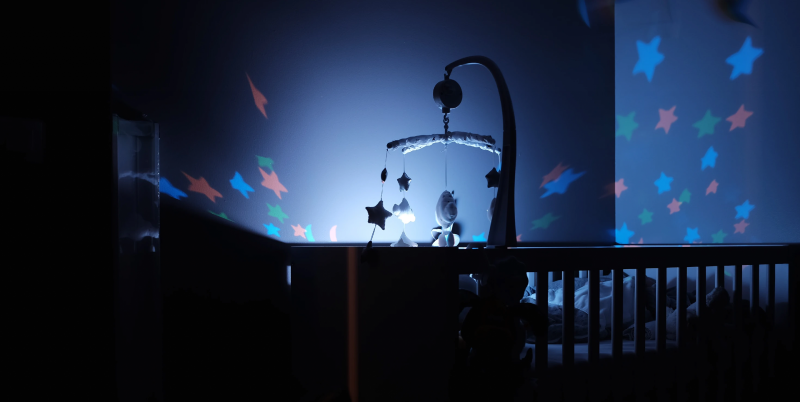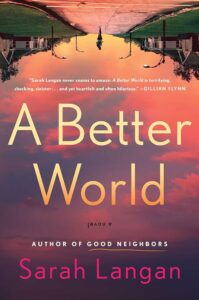A better world is a near future story told through the perspective of a doctor, mother, and wife, who moves with her family to a protected company town where she thinks they’ll all be safe. She soon discovers that this town is hiding secrets about how it was founded, and upon whose backs that safety is won.
It was great fun to write, inspired by Atwood, Jackson, and Levin. It looks ahead while nodding to those fun stories from the 1970s that were both more mainstream and more jaundiced, because of the era that made them popular.
The nascent idea for A Better World was founded on an unwelcome repetitive thought I developed as a new mom and it was that thought that informs my novel’s inciting incident.
As the youngest in my family, I’d had little exposure to infants (or babies, toddlers, or children, for that matter). Though my mom and I were close, she suffered from a lot of health problems and wasn’t able to bestow advice. My husband and I had bought a house in Crown Heights, Brooklyn where I had no local friends. I remember going to a nearby store called Nairobi Knapsack for a meet-up with expectant mothers. I was the only person who showed up.
I had no idea what I was doing when I brought my daughter home from the hospital. Truly. No idea.
I don’t think every parent has this, but until my kids were around three years old, I clocked every item in a room, every subway ride and music class and library, for its potential to rise up like a house alive, and commit harm. My daughters might pull the hot coffee from the table and burn themselves. They might trip and fall into a hard corner. That kitchen shears needed, not just to be put away, but locked in a drawer.
I remember the heat going out one winter night. I was afraid my daughter would be too cold. I slept in her room without a blanket, so I’d be her coal mine canary. Even at the time, I knew this was nuts. I was nuts. But parenthood can do that to you.
As soon as my kids reached the age of reason, that overdrive protection instinct subsided. They were fine. They knew not to eat poison, dump their heads in half-filled buckets of mop water, pull coffee off tables and douse themselves with it. I calmed down. My entire immune system relaxed.
Once it was over, I was able to address a deeper fear I’d had during that time more clearly. During those early years, I’d had a persistent worry that someone might break into the house during the night and hurt them.
I never told people about this worry. It was too weird—too incriminating. It reeked of post partum depression, of madness, of the possibility that I was unfit. My husband traveled a lot. I was often home alone at night. It was at these times that the worry apparated like an unwanted guest: what if someone cut the glass so I didn’t wake? What if they did it so surreptitiously that they left no trace? … What if I not only had to discover the awful evidence, but was blamed?
Before writing this piece, I asked some friends if they’d ever experienced this fear. They looked at me like I was nuts. So I’m willing to believe I’m alone. But it’s a big world. Probably, I’m not.
Immune systems are good at fighting enemies that mean harm to the human body. I’ve got an especially overactive one. I’m the most allergic person I know. For instance, right now I’m recovering from poison oak, for which I’m taking antihistamines, steroids, and this cream that soothes the inflammation for like, five seconds and then it’s itchy again. My system has always been good at fighting bacteria and viruses, but once it gets excited, it likes to keep going. With no more enemies left to fight, it turns on itself.
I think of this fear I had, as a kind of protection instinct gone rogue. In other words, if the enemy wasn’t visible—if it wasn’t hot coffee or heavy furniture, maybe it was something unseen, like an intruder. And if it wasn’t an intruder… maybe it was me?
Yes, I would think, while lying in bed at night. What would happen if I woke up in the morning, and my children had been harmed, but there was no evidence of break-in? Would it be like that guy who got blamed for killing his wife, only she’d been attacked by an owl (This really happened! A guy went to jail for killing his wife and subsequent evidence proved an owl did it!)? …Or would it be something even more sinister? What if it wasn’t an intruder at all? What if it was me?
But this was impossible! I’d never do that! …But what if I had multiple personality disorder and didn’t know it? What if I was Sybil!?!?!
Did you read that book? Sybil was so crazy!
I’d go down the rabbit hole: was reality even real? What if a different me existed in a different reality, and she punched through into this world and took my place, only she was super awful?? To be fair, I didn’t think these thoughts very often. Just sometimes, late at night, wheels spinning, because my formerly active life had suddenly become an island. It’s also just a hazard of the job: my mind is always asking: What if?
The worry speaks to the enormous responsibility of parenthood, which some people are ready for, and others, not so much (oops!). It also speaks to the world we now inhabit, which seems so fraught and untrustworthy. Half the news is apparently fake, but which half? History isn’t history but narrative. Everyone is angry. Psychotic drug dealers are lacing drugs with fentanyl and selling them to middle schoolers (What the hell? Why would they do that?). It turns out that if any of us dig deep enough, we’ll discover that we’re not good people after all. We’re bad guys. But we should probably keep that secret. Because if we’re outed on social media, we won’t be met with any kindness or generosity; only righteous rage like a house, a world, on fire.
About a third of the way through A Better World, I get to the plot point where a mom is accused of endangering her children. My main character, a compassionate woman, investigates what this mom did and why she did it, exposing all kinds of secrets along the way.
Much of the original idea for the book – a mom is accused of harming her own kids late one night – metamorphosed into a larger theme about rogue emotions, particularly fear. My main character has chosen to live in a protected town with high walls and now has to get along with the kinds of people who build walls. But the thing about people like that, in absence of obvious enemies, their fear has no place to go. They begin to attack one another.
***


















